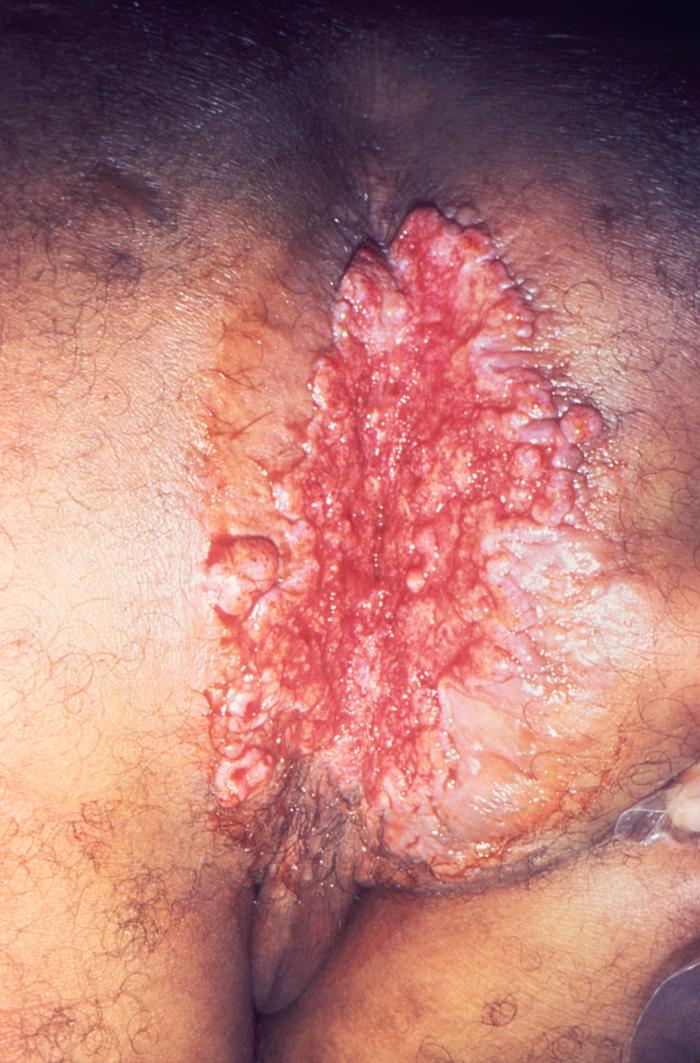File:Granuloma inguinale01.jpeg: Difference between revisions
(This was a very large erosive cutaneous lesion in the perineal region of this patient, which had been diagnosed as Donovanosis, otherwise known as granuloma inguinale, a genital ulcerative disease caused by the Gram-negative bacterium, Klebsiella granu...) |
No edit summary |
||
| Line 1: | Line 1: | ||
This was a very large erosive cutaneous lesion in the perineal region of this patient, which had been diagnosed as Donovanosis, otherwise known as granuloma inguinale, a genital ulcerative disease caused by the Gram-negative bacterium, Klebsiella granulomatis, formerly known as Calymmatobacterium granulomatis, and even earlier Donovania granulomatis. The causative organism is difficult to culture, and diagnosis requires visualization of dark-staining Donovan bodies on tissue crush preparation from a biopsy. | This was a very large erosive cutaneous lesion in the perineal region of this patient, which had been diagnosed as Donovanosis, otherwise known as granuloma inguinale, a genital ulcerative disease caused by the Gram-negative bacterium, Klebsiella granulomatis, formerly known as Calymmatobacterium granulomatis, and even earlier Donovania granulomatis. The causative organism is difficult to culture, and diagnosis requires visualization of dark-staining Donovan bodies on tissue crush preparation from a biopsy. | ||
Created by Samuel Freire da Silva, MD in homage to The Master And Professor Delso Bringel Calheiros. | |||
Image adapted with permission from Dermatology Atlas: http://www.atlasdermatologico.com.br/disease.jsf?diseaseId=109 | |||
[[Category:Atlas of dermatology]] | |||
Latest revision as of 02:17, 23 January 2016
This was a very large erosive cutaneous lesion in the perineal region of this patient, which had been diagnosed as Donovanosis, otherwise known as granuloma inguinale, a genital ulcerative disease caused by the Gram-negative bacterium, Klebsiella granulomatis, formerly known as Calymmatobacterium granulomatis, and even earlier Donovania granulomatis. The causative organism is difficult to culture, and diagnosis requires visualization of dark-staining Donovan bodies on tissue crush preparation from a biopsy. Created by Samuel Freire da Silva, MD in homage to The Master And Professor Delso Bringel Calheiros. Image adapted with permission from Dermatology Atlas: http://www.atlasdermatologico.com.br/disease.jsf?diseaseId=109
File history
Click on a date/time to view the file as it appeared at that time.
| Date/Time | Thumbnail | Dimensions | User | Comment | |
|---|---|---|---|---|---|
| current | 21:19, 10 December 2014 |  | 700 × 1,063 (117 KB) | Jesus Hernandez (talk | contribs) | This was a very large erosive cutaneous lesion in the perineal region of this patient, which had been diagnosed as Donovanosis, otherwise known as granuloma inguinale, a genital ulcerative disease caused by the Gram-negative bacterium, Klebsiella granu... |
You cannot overwrite this file.
File usage
The following page uses this file: